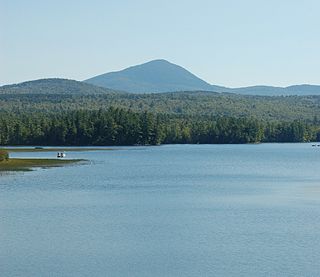Related Research Articles

Flour is a powder made by grinding raw grains, roots, beans, nuts, or seeds. Flours are used to make many different foods. Cereal flour, particularly wheat flour, is the main ingredient of bread, which is a staple food for many cultures. Corn flour has been important in Mesoamerican cuisine since ancient times and remains a staple in the Americas. Rye flour is a constituent of bread in central and northern Europe.

Weld is a town in Franklin County, Maine, United States. The population was 376 at the 2020 census. Set beside Webb Lake and almost surrounded by mountains, Weld is noted for its scenic beauty. It is home to Mount Blue State Park, Camp Kawanhee for Boys, and Camp Lawroweld.

Andover is a town in Oxford County, Maine, United States. The population was 752 at the 2020 census. Set among mountains and crossed by the Appalachian Trail, Andover is home to the Lovejoy Covered Bridge and was the site of the Andover Earth Station.

North Andover is an affluent town in Essex County, Massachusetts, United States. At the 2020 census the population was 30,915.
Phillips Academy is a co-educational university-preparatory school for boarding and day students in grades 9–12, along with a post-graduate year. The school is in Andover, Massachusetts, United States, 25 miles north of Boston. Phillips Academy has 1,131 students, and is a highly selective school, accepting 13% of applicants with a yield as high as 86%. It is part of the Eight Schools Association and the Ten Schools Admissions Organization, as well as the G30 Schools Group.

Andover is a town in Essex County, Massachusetts, United States. It was settled in 1642 and incorporated in 1646. As of the 2020 census, the population was 36,569. It is located 20 miles (32 km) north of Boston and 4 miles (6.4 km) south of Lawrence. Part of the town comprises the census-designated place of Andover. It is twinned with its namesake: Andover, Hampshire, England.

Peterborough is a town in Hillsborough County, New Hampshire, United States. The population was 6,418 at the 2020 census. The main village, with 3,090 people at the 2020 census, is defined as the Peterborough census-designated place (CDP) and is located along the Contoocook River at the junction of U.S. Route 202 and New Hampshire Route 101. Peterborough is 38 miles (61 km) west of Manchester and 72 miles (116 km) northwest of Boston.

Abiel Foster was an American clergyman and politician from Canterbury, Province of New Hampshire. He represented New Hampshire in the Continental Congress and the U.S. Congress.

Charles Gordon Atherton was an American politician and lawyer from New Hampshire. He was elected to the United States House of Representatives from 1837 to 1843. He was elected to the United States Senate from 1843 to 1849 and then again in 1853. He was a Democrat.
Abiel Abbot was a prominent clergyman. He was born to John and Abigail Abbot in Andover, Massachusetts. In 1788 he went on to study at Harvard University. In 1792 he received the Bachelor of Arts degree with honors.

Abiel Abbot Low was an American entrepreneur, businessman, trader and philanthropist who gained most of his fortune from the China trade, importing teas, porcelains, and silk, and building and operating a fleet of reputable clipper ships.

Moses Tyler Stevens was an American textile manufacturer and a U.S. Representative from Massachusetts.
Samuel Batchelder was a United States inventor and author.
Reverend Abiel Abbot was a Unitarian minister and founder of the first tax-funded free public library. He was born in 1765 to Abiel and Dorcas Abbot in Wilton, New Hampshire. He graduated from Harvard University in 1787, and received his D.D. in 1838. In 1827 he was installed as the minister of the Congregational Church in Peterborough, New Hampshire. He continued to minister until his retirement in 1849.

Osgood Johnson was an American educator and 5th Principal of Phillips Academy Andover from 1833 to 1837.

Ebenezer Pemberton was an American educator and 2nd Principal of Phillips Academy Andover from 1786 to 1793. Refusing to follow his uncle's wishes to become a clergyman, Pemberton pursued a teaching career that would become his life's work. After graduating from Princeton University, he served terms as principal of a number of schools for early education including Plainfield Academy in Plainfield, Connecticut, Phillips Academy, and his own Pemberton Academy in Billerica, Massachusetts. He founded another school in 1810 in Boston, serving as principal there until poor health forced him to retire.
Joshua Atherton, was a lawyer and early anti-slavery campaigner in Massachusetts and New Hampshire. He served as Attorney General of New Hampshire. In later years he was also commissioner for the United States direct tax.

Joseph Hale Abbot was an American educator, inventor, and science writer.
Henry Stevens was an American farmer, Republican politician, and Wisconsin pioneer. He was a member of the Wisconsin State Senate, representing Racine County from 1867 through 1870. He also served in the State Assembly during the 1864 session.

John Stevens was an American farmer, educator, and politician from the U.S. state of New Hampshire. He served 15 years in the New Hampshire House of Representatives, representing Wilton and later Mason.
References
- Wilson, J. G.; Fiske, J., eds. (1900). . Appletons' Cyclopædia of American Biography . New York: D. Appleton.
- Charles H. Atherton (1850). "Memoir of Samuel Abbot, Esq.". Collections of the New Hampshire Historical Society. Vol. 6. New Hampshire Historical Society. pp. 205–211.